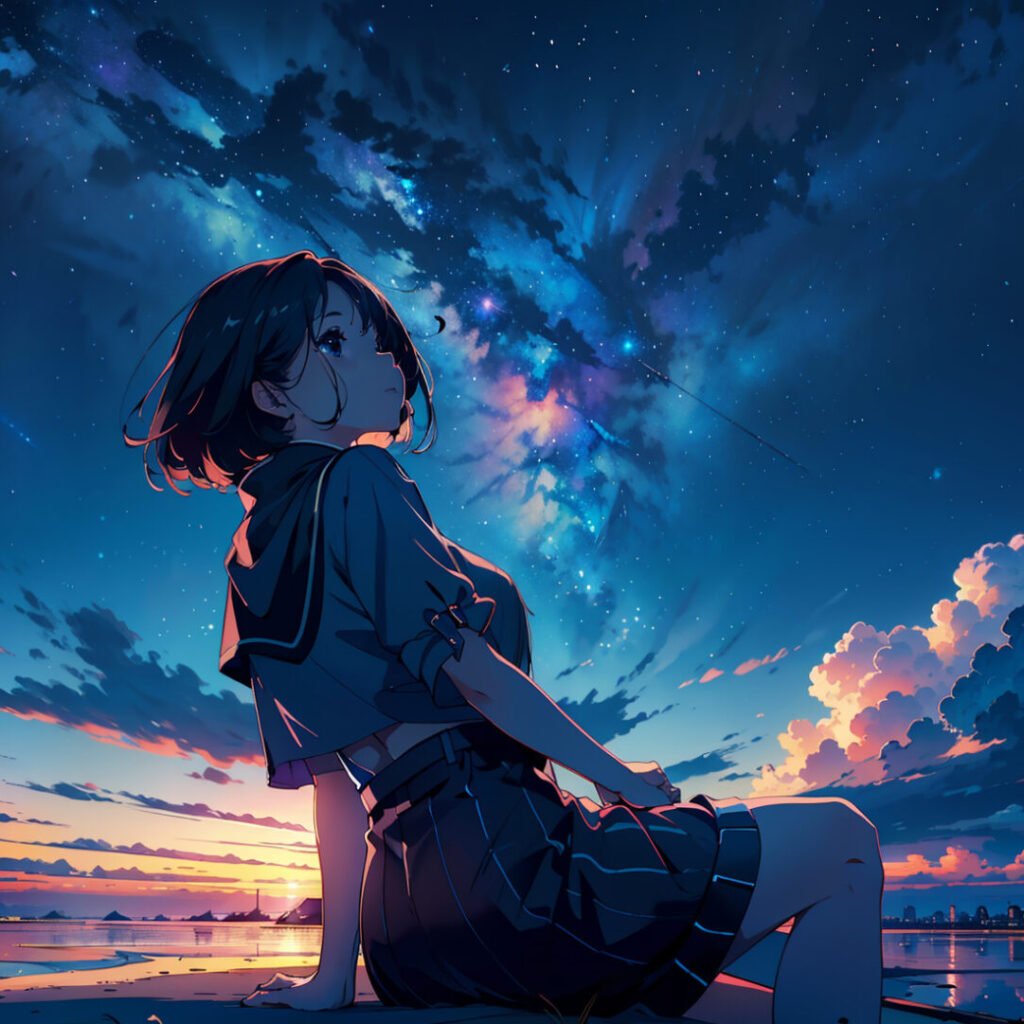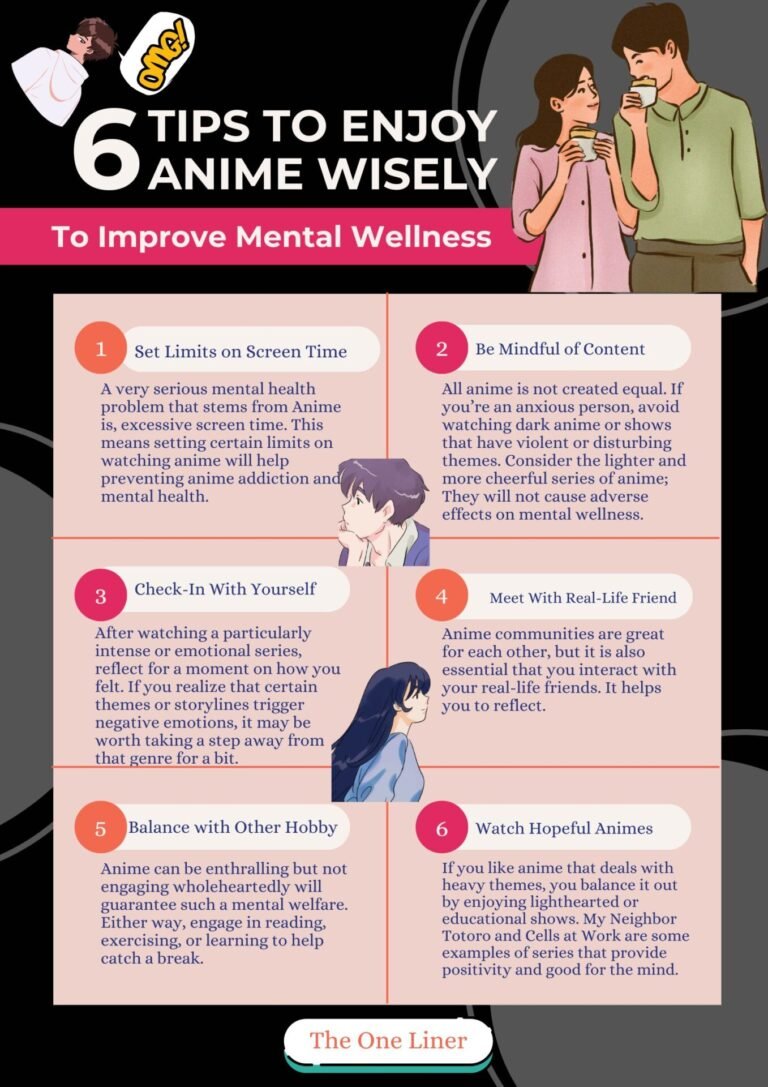Is Anime Bad for Your Mental Health? How to Watch It Wisely?
Shataghnee Chanda
November 02, 2024. 4 minute Read
If you are into anime, and I’m sure you have met one of these pessimistic people who say, “Anime is bad for your mental health!” Well, let us discuss that!
The Japanese manga and anime are now the next big shot in the Indian entertainment industry. The anime market in India is expected to grow at a compound annual growth rate (CAGR) of 13.3% from 2024 to 2032.
Anime is extremely popular today, with millions of fans worldwide, whether in light romantic comedy or deep psychological thriller forms. Though popularity is often penetrating into the next questions: Is anime good or bad for you? Does it influence your personality? And the most trendy one: Why Is anime bad for your mental health?
But, it’s highly important to realise there are thousands of anime fans worldwide and not everyone of them are having mental health issues, or any health issues for that matter. Key lies in limiting your screen times and being responsible while watching series’. If someone crosses the line, then problems of addiction and other issues are bound to arrive. So, don’t be bad in the first place, and enjoy happy reads!
In this article, we shall explore the good sides and the bad sides of anime and mental health, opening some room for you to enjoy your favourites with caution.
Welcome to The One Liner, where we believe our story can change your life.
"
“This article will reveal why if anime is bad for your mental health and how you should watch it wisely to maintain your mental wellness.”
Why Is Anime Bad for Your Mental Health?
While bright colours, captivating storylines, and distinctive characters mean harmless entertainment for some, for others, anime are an entry into unhealthy habits and mental health problems. Here is how negative effects of anime on mental health cause severe damage
1. Addiction Leads To Poor Mental Health
Anime is, of course, an addiction that attracts lots of tongue-wagging, but later leads to excessive screen time, which takes a toll on personal wellness. Long watching hours will effectuate social isolation, disorganization of sleep, and addiction leading to bigger anxiety and depression.
There has been the usual talk of people unable to escape upon the world of fantasy through anime. Of course, several of those connecting from anime dependency have been made with hyped anime and depression observations.
2. Instills Body Image Issues
Anime very often has outlandishly designed characters, whose most flamboyant qualities include a perfect, slender physique and the bodily development of their oversexualised female colleagues. This warped representation surely must leave many an adolescent with a hopelessly misguided sense of beauty; self-image problems follow closely behind.
Some studies find that female portrayals in certain episodes of anime can trigger body dissatisfaction in young females, with consequences for viewers’ self-esteem and mental health. Moreover, romanticized depictions in romantic anime and mental health issues have created unrealistic expectations for relationships, which may further heighten the risk for anxieties.
3. Encourages Violence
Not all the anime under the sun is rose-colored. Violent anime, like Attack on Titan or Tokyo Ghoul, are notorious for intense and graphic violence, which some experts believe can desensitize viewers, alternatively, invoke aggressive behaviors along with it, evoke dark emotions like fear, anxiety thoughts, or even increase stress and panic attacks among others. Dive deeply enough into dark anime and mental health themes, one may find oneself equally battered.
4. Develops Vulnerability
Neon Genesis Evangelion and Death Note are examples of shows that probe darker psychological themes dealing with depression, loneliness, and existential crises. While these might resonate and reflect people’s lives, it might also deepen a vulnerability, increased feelings of isolation, hopelessness, and anxiety. For psychological anime and mental disorders, the distinction between entertainment and its impact on the psyche of viewers is rather murky.
5. Boosts Anxiety
This is another common issue experienced by anime fans-anxiety. Most anime shows have been made to evoke emotional expression, which is a problem for several viewers, and these incisively drawn-out expressions may easily overwhelm those who suffer from anxiety.
Some anime fans have noticed heightened anxiety, stress, and worry after viewing a show that contained deep emotional and psychological issues.
While discussing anime’s impact on mental health, some researchers in Japan suggest that a significant percentage of anime followers have anxiety problems after prolonged exposure to anime series or movies.
Do you know, other than mental health, there are some other problematic aspects as well?
- Anime has a bad impact on sleeping patterns and overall health, as most of the youngsters choose to binge-watch episodes staying up late at night. However, Anime makers can’t help with this. 😛
- One of the stressing concerns is about anime’s portrayal of stereotypes and gender roles. Several traditional anime and manga sexism promote misogyny and try to depict a perfect “Doll-like” idol woman whose main job will be to please men with unreasonable beautification and unrealistic body shapes. But, as it’s evolving, feminist storytellers are coming forward, animes such as Ghibli Movies by Miyazaki, Wakako Zake, Belle are telling different stories. Choice is over viewers!!!
- Critics argue Anime’s influence on consumer culture and materialism have a heavy impact on the youth. For good or bad, it has somehow curved a niche within Indian youth culture as well.
But, is it all bad? Not at all!!
Are There Positive Effects of Anime on Mental Health? Yes!!
On the other hand, let’s balance the scales. While it’s important to examine the negatives, anime is not so bad for mental health, only if viewed with moderation and mindfulness. Let’s consider how some anime contribute positively toward mental health.
1. Anime Allows for Self-Reflection
Certain anime tackle tough mental health topics, aiding the viewers’ contemplation into their own struggles. Series like A Silent Voice deals with issues of bullying, depression, and social anxiety, offering comfort to viewers who may face similar struggles. One of the benefits of anime for mental health is that viewers enjoy validation and companionship in their personal struggles through identification with the characters.
2. Emotional Expression Through Anime
Anime has a unique ability to elicit intense emotions through storytelling. Some people use anime as a release of emotions or even as a form of therapy. Your Lie in April, which overtly brings grief and overcoming trauma into focus. This allows viewers to safely work through their feelings by relating to characters.
It gives some therapeutic effect to many viewers who take care in handling what is present in the story. An emotional connection is a big reason why anime impact on mental health can be beneficial as well if viewed with moderation and mindfulness.
My personal favorite will be nothing other than Your Name, Psycho-Pass, Golden Time—the list is too vast to write…


3. Themes about Mental Disorders Are Educational
Interestingly, a few anime series treated such mental disorders as Attention Deficit Hyperactivity Disorder (ADHD) and depression openly within the target audience. March Comes in Like a Lion is one such subject that offers reflections for sensitivity on depression and anxiety.
Such shows raise awareness for mental health and nurture empathy on mental disorders. Such an education in anime or in matters of mental wellness will also help viewers take help or break free from their shyness to talk about it.
4. Community and Social Connection
The creation of a community is another positive aspect of anime. For many people, creating connections with other fans is one way to combat loneliness or isolation. Online communities, conventions, and fan clubs often foster this sense of belonging and camaraderie, so crucial in promoting mental wellness.
Expecting extra pointers for the positives as well? I know you all!
- Anime has fostered a new era of creativity and imagination. These days content creators are approaching audiences through Japanese culture’s animation, which is a good thing. A survey shows 83% Indians prefer Anime over other animated content!
- Anime has been successful to promote cultural understanding, diversity, and inclusivity. Also, it helps to bring Asian cultural understanding and appreciate them, making Indians more involved in it.
- Personally speaking, I’ve met my anime lover friends and one thing was absolutely common about them. All are becoming polyglot by learning Japanese. Jk! But yes, anime has fostered Japanese culture so deeply that people are very much into learning Japanese.
How to Watch Anime Responsibly and Minimize any Potential Risks to Mental Health?
It is visible that anime can have both positive and negative effects on mental health. So what can you do in watching your favorite shows while responsibly keeping in mind your wellness? Here are some tips for enjoying anime while caring for your mental wellness:
1. Set Limits on Screen Time
A very serious mental health problem that stems from Anime is excessive screen time. This means setting certain limits on watching anime will help prevent anime addiction and mental health. Try to balance it with social interactions in daily life while including time for exercise and engaging in other hobbies.
2. Be Mindful of Content
All anime is not created equal. If you’re an anxious person, avoid watching dark anime or shows that have violent or disturbing themes. Consider the lighter and more cheerful series of anime; They will not cause adverse effects on mental wellness.
Picking up the right content helps keep you away from the many ill effects of violent anime series associated with mental health problems.
3. Check in With Yourself
After watching a particularly intense or emotional series, reflect for a moment on how you felt. If you realize that certain themes or storylines trigger negative emotions, it may be worth taking a step away from that genre for a bit. Just a wee bit of reflection will take you long time in managing the anime and anxiety pairing.
4. Don't Forget Your Real-Life Friend
Anime communities are great for each other, but it is also essential that you interact with your real-life friends. Spending too much time in online anime communities, however, can lead to a sense of detachment from the real world which leads to the feeling of depression and anxiety.
5. Balance Your Anime with Other Hobbies
Anime can be enthralling but not engaging wholeheartedly will guarantee such a mental welfare. Either way, engage in reading, exercising, or learning to help catch a break. This will make sure that anime does not overwhelm you. Finding other interests means you consider anime to be a sure way of entertainment- that’s not addictive.

6. Look For Series Filled With Hope And Is Educational
If you like anime that deals with heavy themes, you balance it out by enjoying lighthearted or educational shows. My Neighbor Totoro and Cells at Work! are some examples of series that provide positivity and good for the mind.
Watching with a positive mind will keep on adding positive energy into one’s life, and it further helps in ensuring that mental wellness is kept in the forefront of your priority list.
These additional tips that will allow you to keep having fun with anime, making sure that anime remains an entertaining and enabling item in your life!!
Final Thoughts
Is Anime Really Bad for Your Mental Health?
The truth is, it’s complicated to answer. Sometimes, anime can trigger negative mental health effects, like addiction; anxiety and unrealistic standards set about body image have been felt. However, anime could be medicinal and a great entry point to meet more people on the same footing. It involves a responsible approach. Watch anime while being sensible about your mental wellness.
At The One Liner, we have a great balance to offer you—anime is neither all bad nor all good. The defining approach on how to watch involves defining boundaries and having an overall awareness as to how watching anime makes one feel. It will be fun, yet your mental wellness is the most valuable. Never compromise it!!!!
If you found it helpful, share it with friends and continue debating about how anime shapes our world—right here at The One Liner! Also, comment below your thoughts about your favorite anime series. The One Liner is always happy to you!! Moreover, remember—mental wellness is important—thus, let the conversation carry forth!




Marvellously penned down..!! Great work Shataghnee.
This literally true for any other media, nothing really special.
Video games,live action movies etc. Can all be categorized in the same way as you have, so no anime doesn’t effect mental health, nor it boosts it. It’s a form of entertainment like any other piece of media we consume. Some people get too obsessed with it, and that results to issues that you have pinned out. You can’t really control people who get obsessed but you can stop new people who are about to enter to get not obsessed, and the ways you have pointed out are great which I will give you that, but again
This same article can be copy pasted to call out any other form of media too.